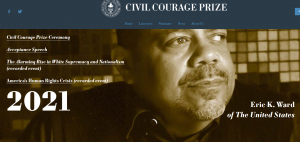I decided to try to the Detain / Release simulation. In my life I have been quite aware of the privilege I’ve had in being lucky enough to be born as a Caucasian female in a wealthy comfortable country like Canada, especially since I grew up in a small town in British Columbia (way at the end of Hwy 101 in Powell River). When I was 16, I went to a boarding school in France and met someone who turned out to be my first African-American male friend (he was at the school on a scholarship and had to do odd jobs around the school like paint the building we lived and studied in).


Anyway, this sounds like a cheesy movie story, but Eric Ward was/is my friend, and he was the first person to snap me out of my petulant teenage girl funk (something about being bored with life and having a disagreement with a boyfriend probably) but sitting me down and telling me that I did not have real problems. He was the first person I’d met who told me about growing up as a young African American boy outside of Los Angeles, running from gangs and police constantly, losing friends and uncles, the stress of running home from school every day without getting caught by either gangs that insisted he join them or by police officers who would give tickets and arrests for no reason other than what he looked like and that he was outside of his house (sometimes it was a problem even being inside!). He lost an eye when gang members shot into his house when he was 10. Eric was the first person in his family to go to university, he then studied law and he has been working in civil rights since we all graduated from university in Oregon. He has now become the Executive Director of the Western States Center, Senior Fellow with the Southern Poverty Law Centre and Race Forward, and Co-Chair of the Proteus Fund, AND he was just awarded the 2021 Civil Courage Prize – honoring “the extraordinary few among us who stand between oppressors and the rest of us.” and the FIRST AMERICAN ever to receive this prize. Eric is based in Portland, Oregon, and has stayed there because he knows the deep problems with racism and white extremism that exist there (e.g. within the Portland Police Force and their links to the Proud Boys). I’m not sure if you are aware of all the protests and violence that Portland has experienced during the last 5-6 years, especially with the Black Lives Matter movement and the rise of authoritarianism in the US. Eric is a target and a mentor to many. I am so proud of Eric and I’m extremely privileged to have had him in my life all these years to jolt me outside of my little white girl bubble. Here is more information about Eric’s work if you’re interested: https://www.civilcourageprize.org/2021-eric-ward

photo credit: Amy McMullen Photograph
Anyway, I described my friendship with Eric to point out that I was not shocked at all by what we learned in this week’s podcasts about the negative affects of these algorithms, especially used by something as blunt and already racist as the DOJ and some police forces (see Portland, Oregon). I appreciated Dr. Cathy O’Neil’s passion and clarity of expression to communicate to the general public that math can be used as a ‘Weapon of Math Destruction’, linked to Dr. Shannon Vallor’s clear explanations of what ‘exactly’ AI is, and/or could be, and the role people have in creating, training and interpreting algorithms. This aspect was new to me, or became much clearer.
In my experience with the Detain / Release simulation, I was very wary and did not want to be swayed by the signals given by the algorithms for this exercise. I went through only 21 defendants before I was ‘voted out’ by the town, and this didn’t really surprise me (supposedly they are ‘recall happy’ anyway!), but I can imagine the stress this must put on judges. On the one hand, you want to be fair and not to penalize people who have been caught up in this trap because of their race, ethnicity, gender and age (black males aged 14-24), but if you release ‘too many’ defendants, and they are then caught back up by a police office for a petty crime, you risk losing your seat as a judge. It’s a rigged system on this level too (at least for this ‘recall happy’ town).
I noticed that even with my defenses way up in this exercise, of the 21 defendants I evaluated, I still detained 9 people, while the prosecution suggested I detain 13. I had rules for what would trigger a ‘detention’ – if the prosecution, the crime (assault, for example), and the likelihood to commit all indicated a possibility that the defendant would do something violent while on bail, then I detained. But for drugs, forgery, use of weapons, theft and burglary, I tried to release until pre-trail, especially because I know the impact this detention would have on the defendant. What really confused me was what the algorithms were basing their predictions on? This became very confusing when I had two defendants, both committing the same crime (drug trafficking), both were 23 yr old males, one white and one African American, but the prosecution told me to release the white defendant and all the signals were ‘green’ (low), while for the same charge the African American defendant, the prosecution told me he was likely to commit a new crime and the signals were yellow (medium) and red (high) for violence. I detained the African American defendant based on the prosecution’s advice combined with the signal from the algorithm that he would likely do something violent while out on bail. But when I noticed the same crime a few defendants later, I was very annoyed and felt manipulated.
Another trend I noticed that confirmed what I understood about these individuals getting caught up in the criminal justice system was that when I released four of the defendants (sometimes when the prosecution also suggested releasing them), three of the four defendants were arrested again for really minor things like ‘suspicion of forgery’ and reckless driving. Is this part of the ‘pernicious feedback loop’ that Cathy O’Neil is talking about? It sure seemed like it!